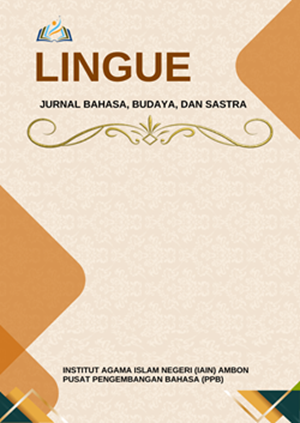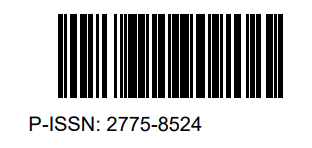EKSISTENSI PEREMPUAN DALAM TRADISI HARI FATIMAH DI PELAUW MALUKU: KAJIAN FEMINISME SIMONE DE BEAUVOIR DAN FATIMA MERNISSI
DOI:
https://doi.org/10.33477/lingue.v6i1.7870Abstract
Abstract This study aims to describe the existence of women in the tradition of Fatima Day in the country of Pelauw Maluku Tengah. This type of research is qualitative description with the feminism theory approach of Simone de Beauvoir and Fatima Mernissi with data sources such as documents, videos and interviews. Based on the results of the research, it was concluded that the existence of women in the tradition of Fatima Day as in the procession of Ma’a koku sanama manu and ma’a hu’u uru there was a correspondence with the thinking of Simone de Beauvoir about women and history as well as women of the present. Unlike the Beauvoir feminism, the correspondence of the Fatima day tradition with the thought of the feminist Fatima Mernissi, that is, women participate in the role of reading the Zikir in the Procession of the Sahut and Zikir up Fatima. In addition, women in their daily lives are free to participate and actively participate in the social life, some professing as teachers, lecturers, government officials, private, merchants, students and students. Keywords: Fatimah Day, traditions, women, feminist theoryDownloads
Published
How to Cite
Issue
Section
License
If accepted for publication, the copyright of the article belongs to the author. Copyright includes the exclusive right to reproduce or transmit manuscripts in any form and media: reprint, produce photographs, microfilm, or translated versions of the manuscript. Increasing parts of this journal, storage and transmission of databases of any form or media, such as electronic copies, electrostatic and mechanical copies, photocopies, recordings, magnetic media and so on are permitted without permission. LINGUE: Jurnal Bahasa, Budaya dan Sastra, allow readers to read, download, copy, distribute, print, search, or link the fulltext of its articles and allow readers to use them for any other lawful purpose. However, it can not be used for commercial purposes
Jika diterima untuk publikasi, hak cipta artikel adalah milik penulis. Hak Cipta mencakup hak eksklusif untuk mereproduksi atau mengirimkan manuskrip dalam bentuk dan media apa pun: mencetak ulang, menghasilkan foto, mikrofilm, atau versi terjemahan dari manuskrip tersebut. Memperbanyak bagian jurnal ini, penyimpanan dan transmisi database dalam bentuk atau media apa pun, seperti salinan elektronik, salinan elektrostatis dan mekanis, fotokopi, rekaman, media magnetis, dan sebagainya diizinkan tanpa izin. LINGUE: Jurnal Bahasa,Budaya dan Sastra, memungkinkan pembaca untuk membaca, mengunduh, menyalin, mendistribusikan, mencetak, mencari, atau menautkan teks lengkap artikelnya dan memungkinkan pembaca untuk menggunakannya untuk tujuan yang sah lainnya. Namun, tidak dapat digunakan untuk tujuan komersial

LINGUE : Jurnal Bahasa, Budaya, dan Sastra Ciptaan disebarluaskan di bawah Lisensi Creative Commons Atribusi-TanpaTurunan 4.0 Internasional.







